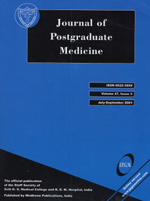
|
Journal of Postgraduate Medicine
Medknow Publications and Staff Society of Seth GS Medical College and KEM Hospital, Mumbai, India
ISSN: 0022-3859 EISSN: 0972-2823
Vol. 55, Num. 2, 2009, pp. 151-152
|
Journal of Postgraduate Medicine, Vol. 55, No. 2, April-June, 2009, pp. 151-152
Letter
The value of communication
Krishna SK
Imperial College London
Correspondence Address:Imperial College London
sreedhar.krishna@imperial.ac.uk
Code Number: jp09043
Related article: jp09017
PMID: 19550068
DOI: 10.4103/0022-3859.52854
Sir,
I read Kulkarni′s short paper [1] with interest; it is reassuring to learn that this young student, at least, recognizes the value of effective communication. Kulkarni, however, rationalizes the argument for improved communication skills, by examining patient distress and future receptiveness, to students. Instead, I suggest that there is a rather more concrete reason for one to improve in this domain: Improved clinical outcomes!
- Good communication enables doctors to identify patients′ problems more accurately. [2]
- Patients will thus better understand their own condition, treatment options, and prognosis.
- Informed patients are far more likely to be compliant with the prescribed therapy. [3]
Moreover, when communication skills are used effectively, a doctor′s own wellbeing is improved. [4]
Even as Kulkarni suggests that these skills can largely be taught in the preceding week of lectures, I suggest that any solution requires greater student proactivity than can be achieved in large lecture theaters. Before unleashing students to the wards, it would be wise, as well as safer, to ′model′ appropriate behaviors in a controlled environment. If resources permit, this is best achieved via a cohesive three-stage process, with each stage demanding progressively more student input.
- Teachers should demonstrate key communication skills in action - with audio or video recordings of real consultations. The participants should then discuss the impact of these skills on the patient and doctor.
- Having learnt the skills under supervision, an interactive demonstration could now be used. A facilitator conducts a consultation as he or she does in real life, but instead uses a simulated patient. The interviewer asks the group to suggest strategies that he or she should use to begin the consultation. Competing strategies are tried out for a few minutes, after which the interviewer asks for student′s views and feelings about the strategies used. They are asked to predict the impact on the patient. Unlike audiotaped or videotaped feedback of real consultations, the ′patient′ can also give feedback. This confirms or refutes the group′s suggestions. This process is repeated, to work through a consultation, so that the group learns about the utility of key skills.
- Once these key skills have been demonstrated, the students can interact with a simulated patient. For a simulation exercise to be effective, students must be given feedback objectively by audiotape or videotape. [4]
Ideally, teaching groups should be limited to four or six participants, as this has been shown to create a sense of personal safety required for students to disclose relevant attitudes and feelings. Furthermore, this also allows more opportunity to practice key communication tasks. [6] The medical student who emerges from such a training program will not only be skilled for future patient interactions, but will also be undoubtedly ′safer′ on the ward. As tactful, thoughtful students roam the wards - this can only be good, for us as well as for the patient.
References
| 1. |
Kulkarni GV. The Student-patient relationship: A student's perspective on the grey areas. J Postgrad Med 2009;55:72 Back to cited text no. 1 [PUBMED]  [BIOLINE] [BIOLINE] |
| 2. | Maguire P, Fairbairn S, Fletcher C. Consultation skills of young doctors: I--Benefits of feedback training in interviewing as students persist. BMJ 1986;292:1573-8. Back to cited text no. 2 [PUBMED] [FULLTEXT] |
| 3. | Silverman J, Kurtz S, Draper J. Skills for communicating with patients. Oxford: Radcliffe Medical Press; 1998. Back to cited text no. 3 |
| 4. | Ramirez AJ, Graham J, Richards MA, Cull A, Gregory WM. Mental health of hospital consultants: The effects of stress and satisfaction of work. Lancet 1995;16:724-8. Back to cited text no. 4 |
| 5. | Maguire P, Roe T, Goldberg D, Jones S, Hyde C, O'Dowd T. The value of feedback in teaching interviewing skills to medical students. Psychol Med 1978;8:695-704. Back to cited text no. 5 |
| 6. | Parle M, Maguire P, Heaven C. The development of a training model to improve health professionals' skills, self-efficacy and outcome expectancies when communicating with cancer patients. Soc Sci Med 1997;44:231-40. Back to cited text no. 6 [PUBMED] [FULLTEXT] |
Copyright 2009 - Journal of Postgraduate Medicine
|
